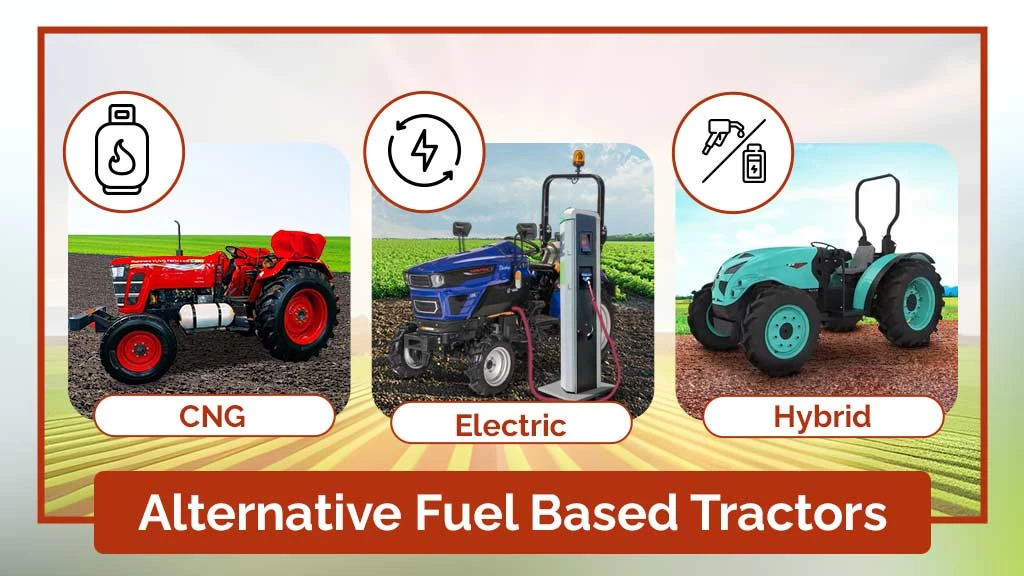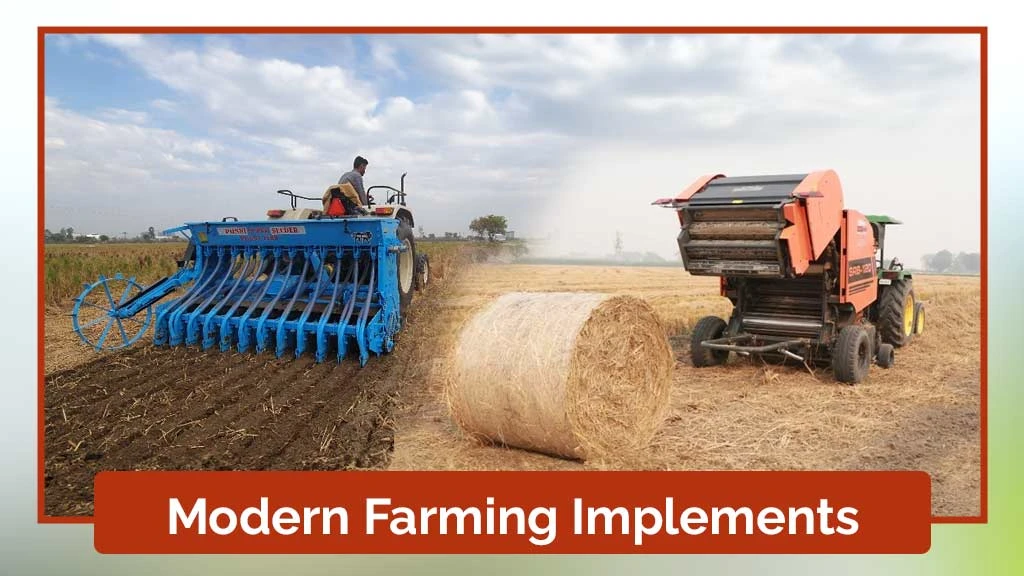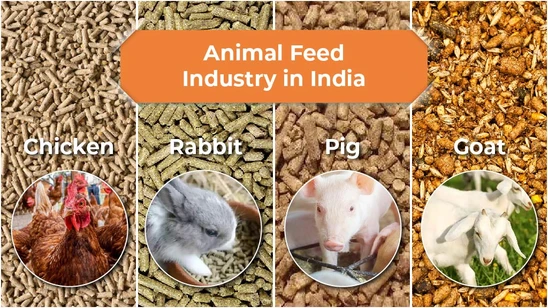Top Innovations Set to Revolutionise the Tractor Industry in India

Table of Contents
- Introduction
- Smart Tractors
- Autonomous Tractors
- Alternative Fuel Based Tractors
- CRDI Engine Tractors
- Feature Packed Mini Tractors
- Modern Farming Implements
- Conclusion
Introduction
The evolving need of farmers and advancement in automations, robotics, electrification & precision agriculture has put the Indian tractor industry on the path of innovation led growth. The focus of these innovations is on making the farming operations easy & efficient, increasing the productivity and the income of farmers.
Let us see in the below given sections the top innovations happening in tractor industry.
Smart Tractors

Equipped with advanced technologies such as GPS, Sensors and AI, the smart tractors are designed to make farming more efficient and keep the yield in the control of farmers. They are easier to use and help enhance productivity. Plus, they also help increase flexibility in the use of tractors to suit modern farming methods. The purpose of these tractors is to make farming practices intelligent and accurate.
Today, many top OEMs such as Mahindra, New Holland, John Deere, and Escorts have launched tractors with smart features. Some of them are mentioned below:
|
Tractor Brand |
Smart Feature |
Usage |
|
John Deere |
JD Link |
Monitor tractor performance, optimise operational efficiency and track field activities. |
|
New Holland |
Skywatch |
Track and trace your tractor anywhere anytime and get engine updates, geofencing, etc. |
|
Mahindra |
Digi Sense |
Track and monitor the health of your tractor along with receiving alerts. |
|
Escorts |
24 X 7 button |
Provide immediate technical assistance to farmers in far flung areas. |
Autonomous Tractors

The rise in the precision farming practices has minimized the use of manual labour and enhanced farm productivity with minimal efforts. Also, it has necessitated the manufacturing of automated tractors, which is a natural extension of precision agritech.
Automated tractors are driverless tractors, which are equipped with advanced navigation system & sensors. They do their tasks on their own and allow you to focus on other farm tasks. Farmers just need to pre-program their tractors to perform specific farm tasks and follow specific paths.
The top tractor brands such as John Deere and Escorts have been at the forefront in manufacturing autonomous tractors.
John Deere AutoTrac Technology: It is an advanced vehicle guidance system that provides a straight path guidance solution to the farmers. It allows farmers to create uniform parallel rows without any overlap for sowing and other agricultural activities. Thus, farmer is able to do more with less fatigue and effort.
Mahindra Tractors & Escorts Tractor: Mahindra Tractors launched its driverless tractors in 2017 and Escorts tractors has made an announcement to launch its driverless tractor which would use the new technologies based on sensor provided data & applications to provide automated farm solutions to the farmers.
Alternative Fuel Based Tractors

The need to have a greener alternative to traditional diesel-powered tractors have given rise to the manufacturing of tractors based on alternative fuels like CNG, Hybrid fuel, and electricity. The use of these tractors will ensure greener environment, less operational cost and increased productivity.
CNG Tractors
These eco-friendly tractors use Compressed Natural Gas (CNG) as fuel in place of diesel. In 2021, Road Transport Minister Shri Nitin Gadkari converted his diesel tractor to CNG to showcase India’s first CNG tractor. Later in 2023, the leading tractor brand Mahindra Tractors launched its first CNG tractor in Nagpur on its Yuvo Tech Series+ tractor platform.
Electric Tractors
These tractors use lithium battery to power the tractor. They come with quick torque delivery, better driving experience, lower maintenance & operational cost, and above all zero emission. The use of electric tractors helps reduce emissions by 40%.
The first tractor manufacturer to talk about the concept of electric tractors was Escorts way back in 2017. However, Sonalika Tractors launched the first field-ready electric tractor in the form of Sonalika Tiger Electric in 2021. Today, many OEMs have entered the fray. Some of them are Cellestial Tractors and AutoNxt Tractors.
Hybrid Tractors
These tractors use hybrid fuel to power the tractor, that is, it runs on electric as well as diesel. HAV Tractors was the first manufacturer to showcase Hybrid tractors at 2019 Agri Technica Event in Germany. However, Solis Tractors was first to launch hybrid tractors in India in form of Solis 5015 E Hybrid in 2021.
CRDI Engine Tractors

The need to set stricter emission limits for diesel-run tractors in India as per the Trem IV Emission Norms have led to production of tractors based on CRDI fuel pump in place of Inline fuel pumps for tractors above 50 HP.
The Common Rail Direct Injection (CRDI) fuel pumps uses a common rail to supply pressurised fuel to individual injectors allowing precise control over fuel injection pressure and timing. These pumps offer excellent fuel efficiency resulting in lower operational cost and offer optimum combustion for enhanced power, torque and lower emission.
Some of the famous CRDI fuel pump operated tractors are John Deere 5310 Gear Pro Trem IV and Mahindra Novo 655 DI PP V1.
Featured Packed Mini Tractors

Mini tractors in India are an ideal tractor for inter-crop cultivation and small & marginal farmers. Earlier these tractors use to come with simple features like single cylinder engine, sliding mesh gearbox, single clutch, etc. The need to provide small farmers compact tractors that offers greater value-for-money, has given rise to innovations in this segment. Now, manufacturers are offering mini tractors with higher-end features like 3-cylinder engine, synchromesh gearbox, double clutch, higher lifting capacity, etc.
Some of the popular feature-packed mini tractors are Swaraj Target 630, Mahindra OJA 2121 4WD, and VST Shakti 932 DI.
Modern Farming Implements

The need for in-situ crop management to control air pollution, on the one hand, and to enhance productivity, on the other, has necessitated the use of modern farming implements with innovative features. One such example is Super Seeder, which performs three important functions in a single pass. These include tilling, sowing seeds with fertiliser and covering the seedbed with cut paddy stubbles. As a result, the need to burn paddy stubbles is reduced improving air quality.
Conclusion
The tractor industry in India is at the cusp of transformation due to constant innovations taking place with a view to save time, money and labour. Top innovations like use of advanced navigation system, AI, Sensors, Internet of Things, and Robotics will help enhance farm productivity with very less effort, reduce dependency on labours, increase farmer’s income of farmers and pave the way for smarter agriculture.


Related Blogs















